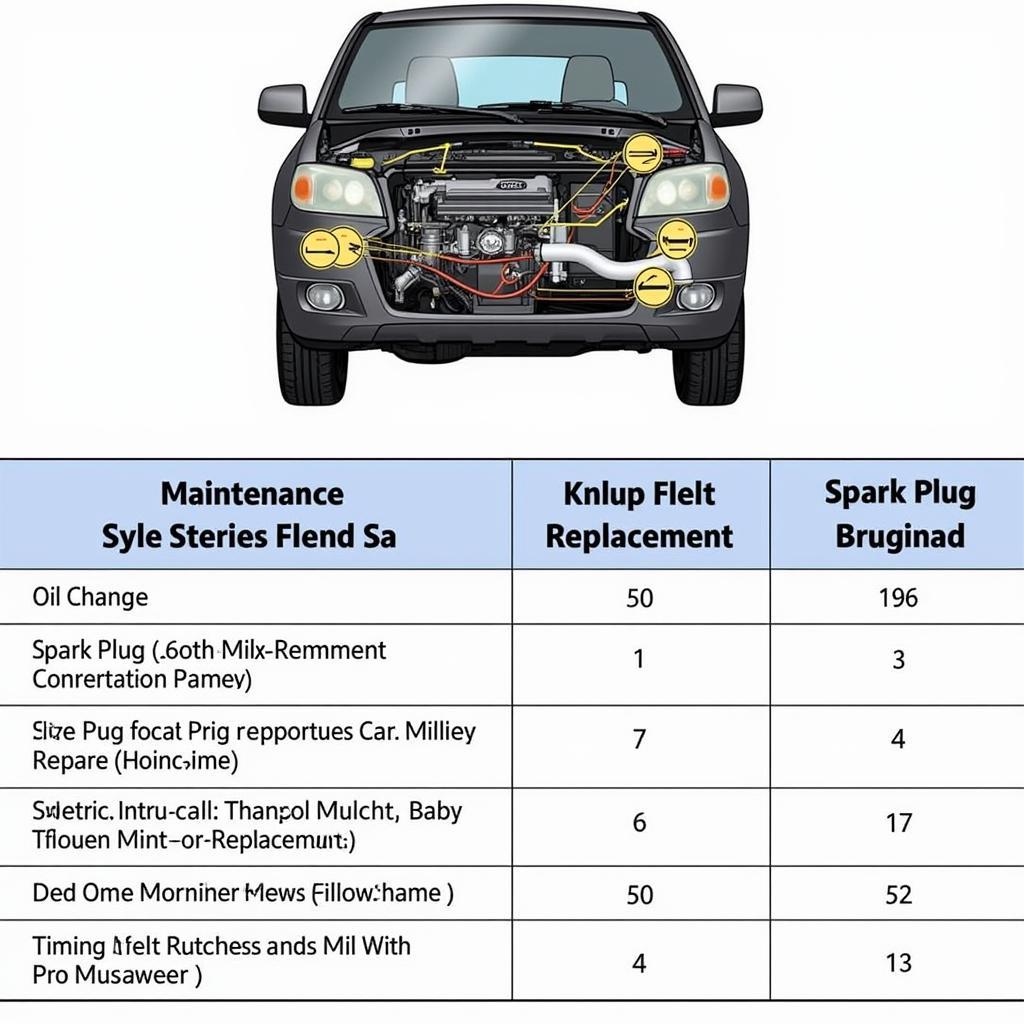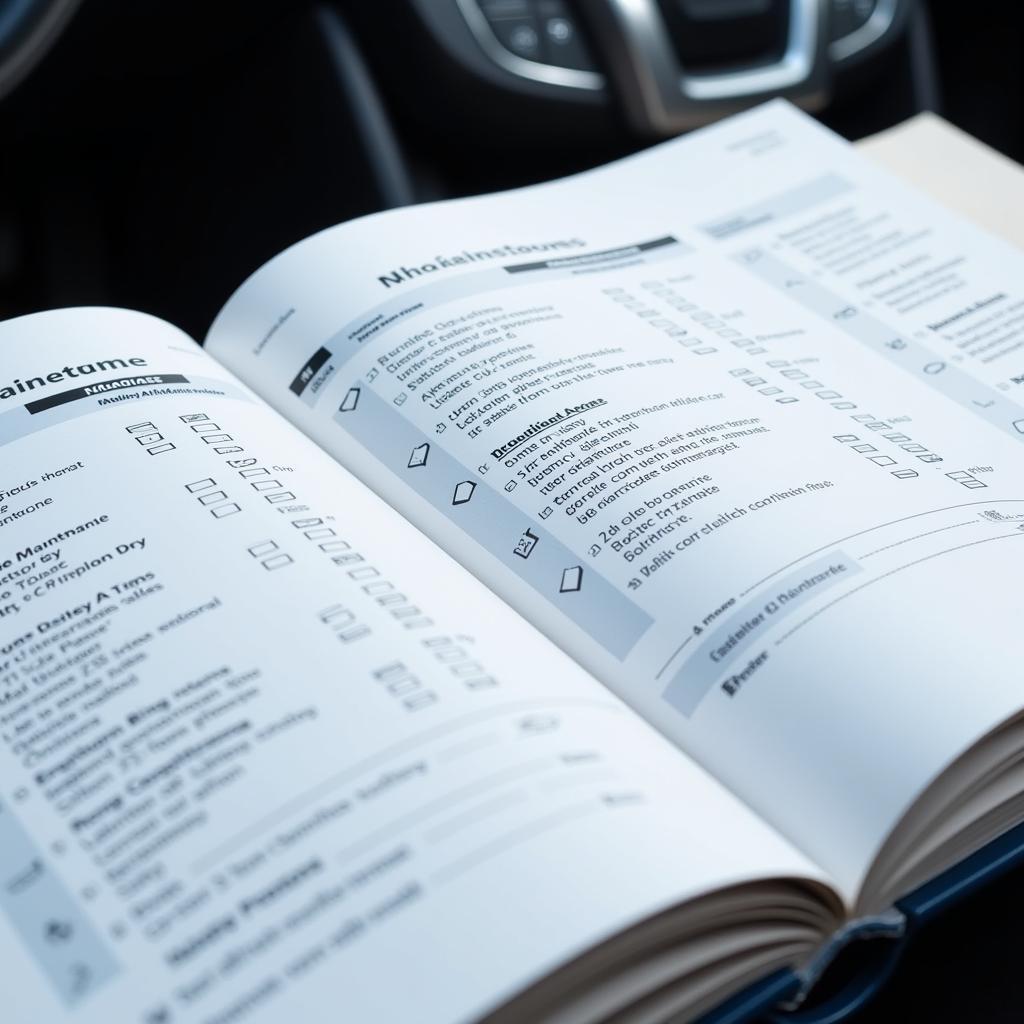Understanding how car manufacturers determine maintenance schedules is crucial for every car owner. This knowledge empowers you to make informed decisions about your vehicle’s upkeep, potentially saving you money and extending the life of your car. Knowing how these schedules are created also helps you understand the “why” behind each service recommendation. Let’s dive into the factors that influence car manufacturers’ maintenance guidelines.
If you’re curious about how much maintenance costs for different brands, check out this helpful car brand maintenance cost list.
Factors Influencing Car Manufacturers Maintenance Schedules
Several key elements contribute to how car manufacturers determine maintenance schedules. These schedules aren’t arbitrary; they are carefully crafted based on extensive research and testing.
Engineering and Design
The core design of a vehicle plays a significant role. Engine type, transmission, and even the materials used in construction all influence maintenance needs. A high-performance engine might require more frequent oil changes than a standard engine. Similarly, certain transmission types have specific fluid change intervals.
Operating Conditions
Where and how you drive your car greatly impacts its maintenance requirements. Extreme temperatures, dusty environments, and frequent stop-and-go city driving can put more stress on vehicle components. Manufacturers consider these factors when developing maintenance schedules, often providing adjustments for “severe” operating conditions.
Technological Advancements
As technology evolves, so do maintenance requirements. Modern vehicles with advanced electronics and sophisticated systems may have different maintenance needs than older models. For example, electric vehicles have unique maintenance considerations compared to gasoline-powered cars.
 Car Engine Maintenance Schedule Illustration
Car Engine Maintenance Schedule Illustration
Data Analysis and Testing
Manufacturers gather vast amounts of data from real-world testing and customer feedback. This data helps them identify potential issues and refine maintenance schedules to optimize vehicle performance and longevity. They continually analyze this information to ensure that their recommendations are up-to-date and effective.
Legal and Regulatory Requirements
Certain maintenance tasks, such as emissions inspections, are mandated by law. Manufacturers must incorporate these requirements into their maintenance schedules to ensure compliance. These regulations can vary by region and are subject to change.
Understanding Your Car’s Maintenance Schedule
Every vehicle comes with a recommended maintenance schedule outlined in the owner’s manual. This document serves as your primary guide for keeping your car in top condition. The schedule typically includes recommended service intervals for various tasks, such as oil changes, filter replacements, and tire rotations. You might be interested in reading more about jaguar car maintenance, a luxury car brand with specific maintenance needs.
Why Following the Recommended Schedule is Important
Adhering to the manufacturer’s recommended maintenance schedule offers numerous benefits.
- Enhanced Performance: Regular maintenance helps ensure that your vehicle operates at its peak performance level.
- Improved Safety: Properly maintained vehicles are generally safer to drive.
- Increased Resale Value: A well-maintained car will command a higher resale price.
- Warranty Protection: Following the recommended schedule is often a requirement to maintain your vehicle’s warranty.
 Car Maintenance Checklist in Owner’s Manual
Car Maintenance Checklist in Owner’s Manual
How to Interpret the Maintenance Schedule
The maintenance schedule is typically presented in a table format, listing specific tasks and their corresponding intervals based on mileage or time. It’s essential to understand the difference between “normal” and “severe” operating conditions and adjust the schedule accordingly.
Beyond the Basics: Addressing Specific Concerns
While the manufacturer’s schedule provides a general guideline, there may be times when additional maintenance is necessary. Unusual noises, vibrations, or warning lights should be addressed promptly. If you’re looking for cars with minimal maintenance issues, you can explore some options here: cars with the least maintenance issues.
Common Misconceptions about Car Maintenance
- Myth: You only need to change your oil when the oil light comes on. Reality: This is a critical warning sign indicating that your oil level is dangerously low. Regular oil changes are crucial for engine health.
Tips for Effective Car Maintenance
- Keep Records: Maintain detailed records of all maintenance performed on your vehicle. This documentation will be valuable when it comes time to sell or trade in your car. If you’re wondering about the monthly cost of car maintenance, this resource may help: how much is maintenance on cars per month.
“Regular maintenance is not just an expense; it’s an investment in the longevity and performance of your vehicle,” says John Davis, Senior Automotive Engineer at Auto Experts Inc.
Conclusion
Understanding how car manufacturers determine maintenance schedules empowers you to make informed decisions about your car’s care. By following the recommended schedule and addressing any specific concerns promptly, you can ensure that your vehicle remains reliable, safe, and performs at its best. If you have any questions or need assistance with your car’s maintenance, don’t hesitate to contact AutoTipPro at +1 (641) 206-8880 or visit our office at 500 N St Mary’s St, San Antonio, TX 78205, United States. You might also want to check this list of car brands and maintenance costs.
“Preventative maintenance is always more cost-effective than dealing with major repairs down the road,” adds Maria Sanchez, Lead Mechanic at Auto Experts Inc.







Leave a Reply